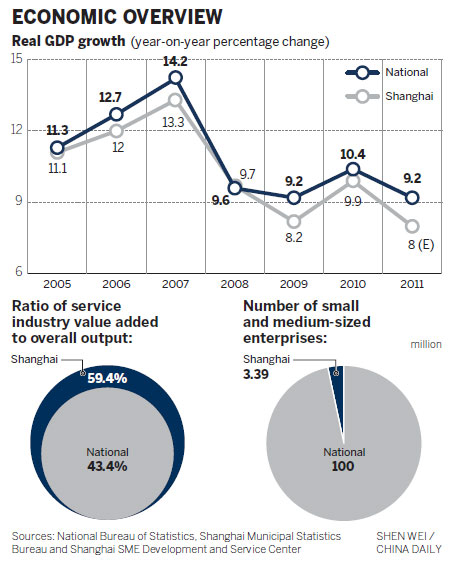 |
|
|
|
|||||||||||
Factory owners in the region are struggling to tap the domestic market as their export orders begin to shrink. Many of them have come to Shanghai looking for help in design and innovation. Their demands have spawned a multi-million yuan design service industry, spearheaded by many talented people who have overseas exposure.
Wang Yang, for instance, studied product design in Europe and returned to Shanghai, her hometown, a few years ago to start her own studio. Many others have followed in her footsteps and are helping to set the trend in packaging and product design that are becoming increasingly popular with local manufacturers and retailers.
In the last two decades, Shanghai has been one of the fastest-developing cities in the world. In 2010, the city's total GDP grew to 1.687 trillion yuan ($266.7 billion) with per capita GDP of 73,297 yuan.
As a means of speeding up the restructuring of the city, Shanghai aims to pay more attention to the tertiary industry, including retail, logistics, trading and consumption, but especially services.
"Moving from being manufacturing-based to service-focused is the best way of ensuring that local residents have a better, improved and higher quality of life in the near future, ahead of other cities in China," said Yu.
According to the city's 12th Five-Year Plan (2011-2015), the annual GDP growth rate will be maintained at 8 percent on average, and a number of innovative measures will be involved in the development.
Shanghai aims to increase the share of the service industry to 65 percent of GDP in the next five years to meet the growing demand from its population of 23 million.
The service industry now accounts for 60 percent of total employment, and contributes 60 percent of economic growth. The latest official figures show that the service sector accounted for at least 70 percent of the local government's fiscal revenue.
|
 |
"The customer service in Shanghai is still not as good as in international cities such as New York, London and Paris, and it will take time for the city to improve its service sector, in tandem with the economic development," said Liu Xiaobing, a professor at the school of public economics and administration at Shanghai University of Finance and Economics.
Liu added that the municipal government has tried to encourage local service providers to offer a better atmosphere in shopping malls and restaurants, which he hopes will be realized soon.
Among the three main drivers of economic development - investment, customer spending and exports - customer spending has jumped to occupy pole position in the past five years with annual average retail sales of consumer goods exceeding 600 billion yuan during the period.
Figures released by the local municipal government show that consumption of daily commodities (300 billion yuan) and food (180 billion yuan) are the areas with the highest annual volume of retail sales.
"The retail industry has prepared for the restructuring of the city by providing more innovative, higher quality products and offering a more pleasant atmosphere for shopping and services to customers from Shanghai and even further away, such as the Yangtze River Delta," said Wang Liuhe, secretary-general of the Shanghai Merchandise Commercial Profession Trade Association.
Statistics from the association show that the merchandising industry increased by 11.2 percent in Shanghai in the first three quarters, of 2011, and the association wants to see an average annual increase of 10 percent in the next five years.
"Bringing the world's best-known brands to the city has become the common goal of big shopping malls, because consumers want to buy more international brands as their incomes rise," said Wang.
At present, 80 percent of the world's top brands have been introduced to Shanghai as companies opened branches and stores in shopping malls.